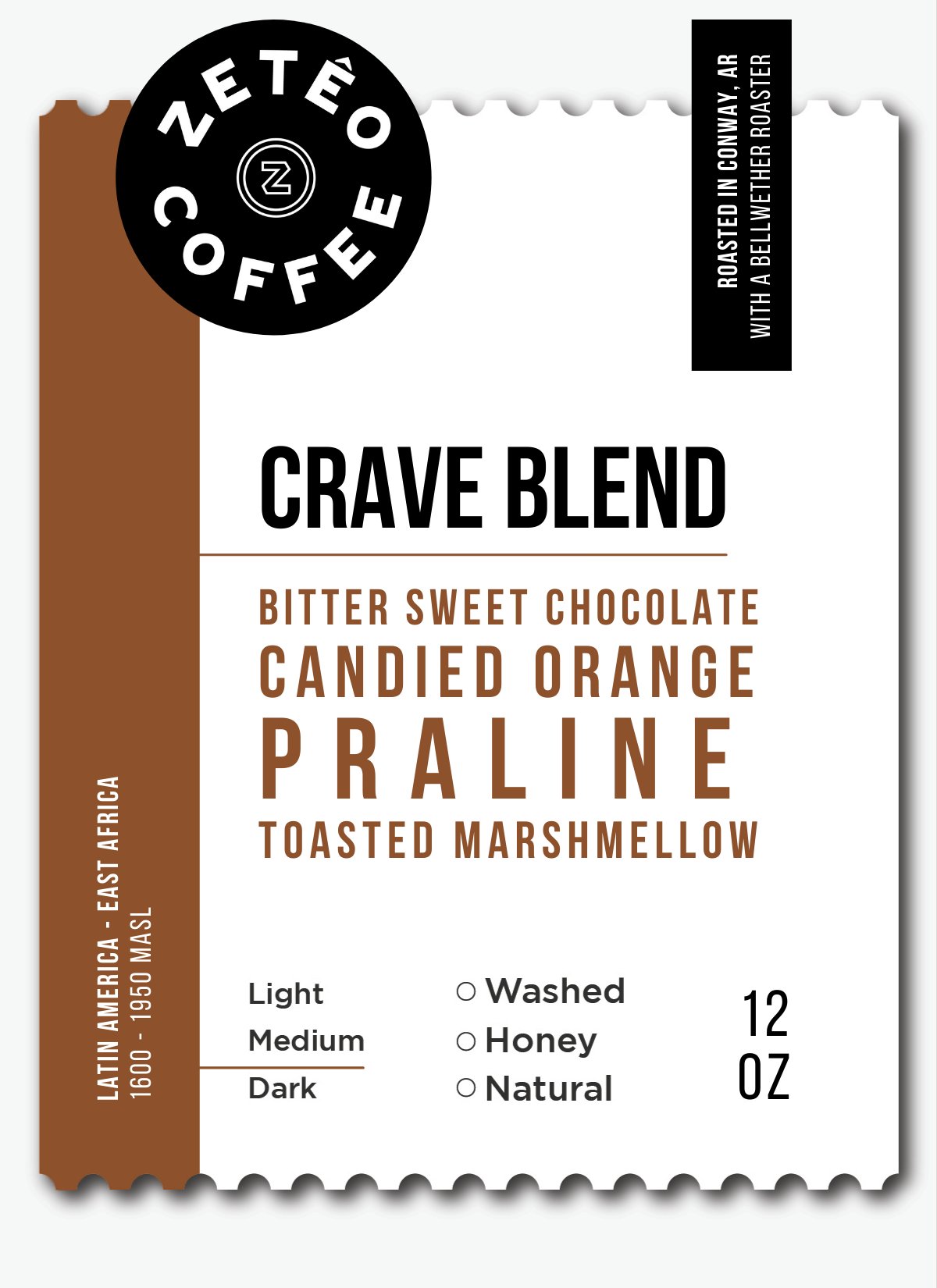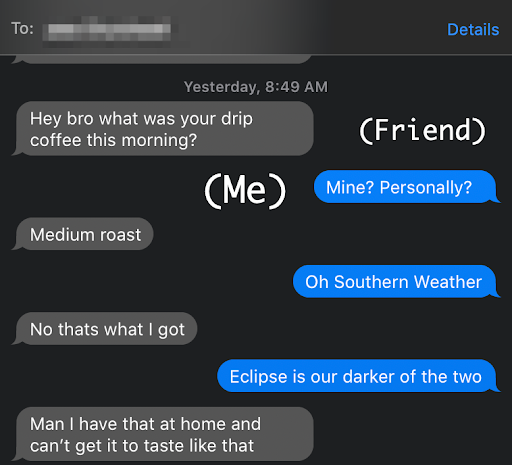I got a text out of the blue the other day from a good friend of mine. He had just come into one of our cafés for his cup of drip coffee, and he basically asked me, “Hey bro, why doesn’t my coffee at home (that’s the same coffee that y'all carry in your shop) taste like it does in the shop?
This is a great question that I’d be willing to bet a lot of specialty coffee shop customers have. The answer to that question is, “well, there can be a number of reasons.”
Ultimately the final experience that you have with your coffee depends on several factors, not just which coffee you buy and take home.
I’ll not go “full nerd” in answering this question, but I will touch on what I consider to be a few high-impact variables that will really affect the taste of your coffee at home, so let’s dive in!
How Quality Is the Coffee?
Believe it or not, all coffees are not equal.
There’s a lot of pretty packaging and branding out there but that doesn’t necessarily mean the beans are quality or that they were roasted well.
Are you buying coffee from a well established, and reputable roaster or are you buying the random coffee off the grocery store shelf that just happened to be on sale?
You may not even care (which I doubt or you wouldn’t be reading this particular article) but it makes a difference.
Specialty coffee is graded on a 100 point scale as determined by the SCA (Specialty Coffee Association).
Coffees graded at 80-84.99 are considered very good.
Coffees graded at an 85-89.99 are considered excellent and coffee graded at 90-100 are graded as outstanding.
All of the coffees sold at your local specialty shop (not just the breakfast joint that mainly serves breakfast) should be carrying coffees that grade anywhere in the 85 to 100 range (in my opinion).
We roast our coffees on a Bellwether Roaster that is 100% electric and extremely consistent.
We order all of our green coffee from a green marketplace that only sells specialty grade coffee.
It's a common belief that the more recent the coffee has been roasted, the “better” the coffee will be. That’s not necessarily true.
There’s a lot of science involved in growing, harvesting, roasting and preparing coffee. Coffee actually releases gasses (commonly referred to as degassing) for 2 - 12 days (give or take) after the coffee has been roasted.
So really, a good time to brew a coffee is after the coffee has had a chance to “rest” and has completed its degassing. Sounds a bit like wine doesn't it?
Quality roasters will understand this and take this resting/degassing period into account before they sell and ship their coffees.
What Kind of Grinder Are You Using To Grind The Coffee?

I could go deep into this topic but that’s not really the point of this article. There are two main types of grinders that most people use.
There’s a blade grinder that has a blade or two blades that spin in a circle and essentially chop up the coffee. These are typically the cheap, $15 grinders from your local discount store.
And then there’s a burr grinder that grinds the coffee between two revolving abrasive surfaces called burrs.
As you can see by the little cartoon drawing here, the burr grinder produces a much more consistent grind that allows for even extraction of the coffee when it comes in contact with water.
Many people end up using blade grinders at home (the less desirable grinder) because the price point of this grinder at the big box store is much lower than a burr grinder.
As the old saying goes though, you get what you pay for many times. I often tell people, "if you're going to spend money on only one thing for your home coffee setup, spend your money on a good grinder.
Go with the burr grinder if you can. It will get the best out of whatever coffee you use.
Coffee To Water Ratio
Although this isn’t an exhaustive list of things that impact the flavor of your coffee, the final thing I’d like to touch on is the ratio of coffee to water that you’re using when brewing your coffee.
Basically how much coffee are you using based on the amount of water that you’re using?
This involves some basic math and the answer to the question “what’s the best ratio” is somewhat subjective really.
I’d also recommend getting a simple scale that weighs in grams to keep the math simple.
Most specialty shops that brew up delicious tasting coffee (you know that coffee that you have at home but just tastes better at the coffee shop) typically will use between a 1 to 15 and 1 to 18 coffee to water ratio.
This means for every gram of coffee you grind and use in your brewing device you’ll want to use roughly 15g to 18g of water. If you like your coffee stronger I’d recommend a 1 to15 ratio and if you like your coffee a little smoother and less strong, find a sweet spot in that 1 to 16 - 1 to 18 range.

Here’s how to figure out the basic math on this.
Let’s say you want to make a full pot of coffee with a standard home coffee “pot”/brewer and the pitcher that the coffee is going to brew into holds about 60 ounces of liquid.
I did some basic googling (60 ounces of water to milliliters) and Google tells me that’s about 1774 ml of water. 1g is roughly equal to 1 ml. Wish you'd paid more attention is Jr. High math class eh? Me too!
To figure this out, you can also take your little scale, put the empty coffee pot on it, zero the scale out and then pour however much water you’re going to want to use in the pot to get the measurement in grams.
Some people may have a way to figure this that requires less steps, but I’m a simple guy so this seems simple to me.
For easy math sake, I’m going to say we’re going to brew this coffee at a 1 to 17 ratio.
So I’m going to get my calculator out (if you’re a mental math genius then congratulations!) and take 1774 (ml of water) and divide it by 17 (grams of coffee) to give me 104g of coffee that I should grind in my burr grinder.
If you like stronger coffee do a 1 to 15 ratio and grind 118 grams of coffee.
Make sense?
Other Things That Impact Coffee Flavor
Other things that can majorly impact a coffee's flavor are quality of water. Is the water hard or soft? Does it have a lot of iron and other minerals in it from the source?
Is your water running through a filtration device? Most specialty coffee shops have all of the water running through their brewing devices going through a filtration system. This makes a difference.
What brewing device you’re using will also impact the final product. You can use the same coffee and get a very different experience between a basic at-home coffee brewer, a Chemex, an Aeropress, and French Press or an espresso machine.
Is That Clear as Mud?
Hopefully that answers the question a little more about why the same coffee that your local coffee shop carries tastes a little different at home.
It’s not impossible to get the same or similar flavors from the coffee at home but it will likely require a little experimentation on your part to figure out what equipment you’re using and what coffee to water ratio you prefer as an individual.
One last thing to put your mind at ease. Coffee is a very individual experience.
Contrary to popular belief, there’s not 100% right or wrong way to prepare your coffee.
You prepare it and experience it the way you personally like it, and to know what that is requires some trial and error and time.
Best of luck and happy brewing!


